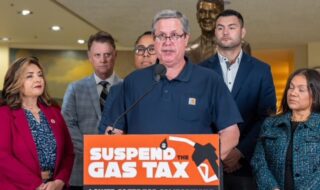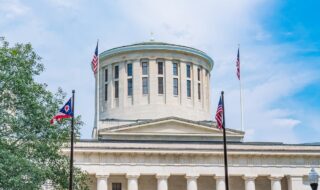February 3, 2025
Gov. Phil Scott Calls For Repeal of Costly Climate Lawsuits
Vermont Climate Law Allows Private Lawsuits to Enforce State Mandates
In his budget address and other public comments, Governor Phil Scott called on Vermont lawmakers to roll back expensive and controversial parts of recently enacted climate change laws. Specifically, Scott called for eliminating the ability for special interest groups to file lawsuits under the 2020 Global Warming Solutions Act (GWSA).
The GWSA established mandatory greenhouse gas emissions targets that ratchet up between 2025 and 2050:
1/1/25: GHG emissions must be 26% below 2005 levels
1/1/30: GHG emissions must be 40% below 1990 levels
1/1/50: GHG emissions must be 80% below 1990 levels.
The act empowers an apppointed Climate Council to propose programs and strategies to meet the targets, and requires the Vermont Agency of Natural Resources (ANR) to adopt rules that implement the plan.
Costly Climate Lawsuits
Notably and controversially, the GWSA also included a private right of action – the ability for anyone to bring a lawsuit – to require the state to enforce the emissions reductions mandate. If they prevail, the party that brought the lawsuit can recover their attorneys fees and court costs… from taxpayers.
This provision stands to be a financial windfall for well-funded special interest groups that already engage in climate activist litigation. The first GWSA lawsuit was filed against the state in late 2024 by the Conservation Law Foundation (CLF), alleging that Vermont is set to miss the initial GWSA reductions target.
CLF is a Boston-based tax-exempt organization that reported $16.5 million in revenue and over $30 million in net assets according to its most recent public tax filing. If it prevails, Vermonters could foot the bill for their lawsuit – and the cost of any subsequent action ordered by the court.
Lawsuits Usurp the Legislative Process
More fundamentally, the private lawsuit provision also outsources policymaking from elected lawmakers to lawyers, judges, and unelected bureaucrats.
Climate change is a global phenomenon, and Vermont accounts for just 0.016% of global CO2 equivalent emissions (when comparing the Vermont Greenhouse Gas Inventory to the European Commission’s World Greenhouse Gas Emissions Report).
Decisions about how taxpayer (or electric ratepayer or fuel customer) dollars are spent on emissions reductions programs belong with policymakers who are accountable to voters. As Vermont has seen with the school funding saga of the past 25 years, court decisions can lead to unpredictable and expensive outcomes without any guarantee of improvement.
When it comes to emissions reductions policies, court-ordered resolutions do not allow for policymakers to fully weigh the costs and benefits to their constituents. Nor does it allow the state to nimbly shift approaches when one strategy proves ineffective or extraordinarily expensive.
GWSA Targets Will Cost Billions to Meet
In January, residents of the Green Mountain State got a small sense of how the cost to meet the GWSA emissions reductions targets when the Vermont PUC released its final report on the Clean Heat Standard. That report found Clean Heat will raise the price of heating fuels by $950 million over its first ten years, while producing just $477 million in benefits. By the tenth year, Vermonters will pay 58 cents per gallon more for heating fuel – and possibly much more.
Residential, commercial, and industrial fuel use accounts for less than a third of GHG emissions in Vermont, and is by no means the most expensive sector to decarbonize.
What’s Next
Prior to Governor Scott’s call to action, some lawmakers had already proposed legislation that would knock out the GWSA’s private right of action. Rep. Jim Harrison (Chittenden) introduced H.52, which would repeal the lawsuit clause and convert the GWSA’s emission reduction target to more flexible goals.
Rep. Mark Higley (Lowell) took it a step further and introduced H.62 to repeal the entire GWSA.
No action has yet been taken on these bills.
NFIB is a member-driven organization advocating on behalf of small and independent businesses nationwide.
Related Articles














